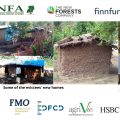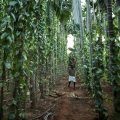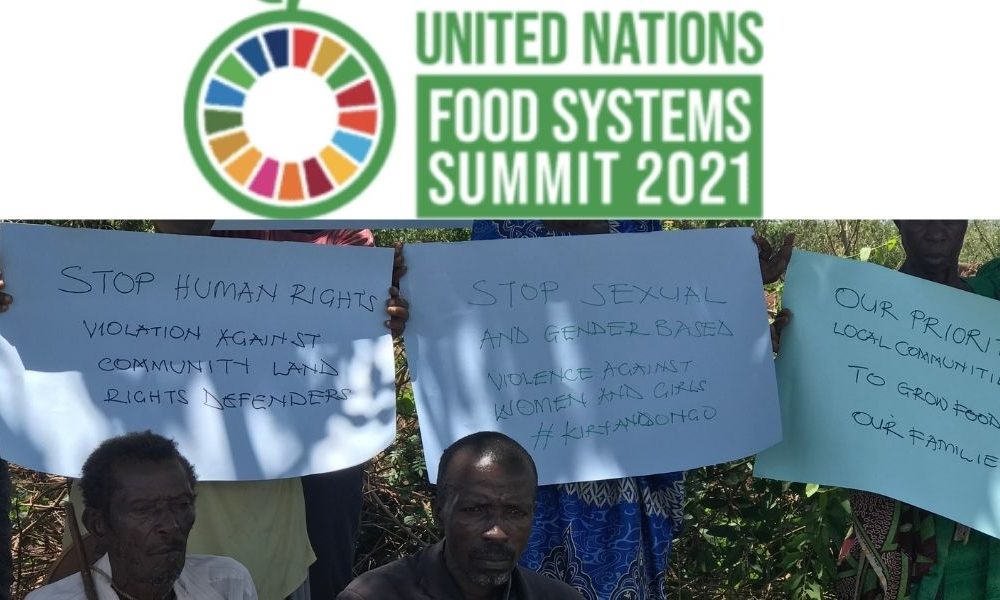Some of the community members affected by land grabbing in Kiryandongo District
By witnessradio.org team.
As the United Nations, is striving to end hunger, achieve food security through sustainable agriculture what they termed as one of the 17 sustainable development goals by 2030, Uganda still grapples with mass forced evictions being aided by International development financiers being hosted and protected by big nations.
In Uganda, the ‘development financing’ has exacerbated poverty, hunger among the local populations, threatened food security, and forced inhabitants to migrate to urbanized cities or working as laborers on large plantation farms established formerly on their land as the only means of looking for survival.
Ever since the mandate to set up the Food Systems Summit was taken over from the Food and Agriculture Organisation (FAO) by the UN secretary-general’s office in close partnership with the World Economic Forum, a private sector organization fronting corporate interests, the summit lost its relevance as far as smallholder farmers concept in Uganda is concerned.
The governance of the summit is under capture by “experts” known to be staunch defenders of industrial agriculture, and wealthy nations, which host many of the large multinational corporations and International Development Financiers, to drive their agenda.
In a bid to translate these aspirations into tangible results, the United Nations’ three-day pre-summit in Rome, which ended on the 28th day of July 2021…. in a lead up to the UN Food Systems Summit in September in New York City, US, made no mention of peasant agroecology, or indigenous ecological knowledge and it’s feared by smallholder farmers to be fronting corporates’ interests.
In a survey conducted by Witness Radio-Uganda on development projects (agribusiness, afforestation, carbon offset projects, mining, and infrastructure development) being financed by members of the World Economic Forum for the last ten years, both COVID-19 lock-downs inclusive, estimate that 1, 257,200 (one million two hundred, fifty-seven thousand and two hundred peasant families have been forcefully evicted or threatened with eviction from more than 5 million Ha.
Approximately 98.2% of the grabbed land or on the verge of being grabbed was agricultural land being used for subsistence farming by local peasants.
As we write this story, Nalumunye Betty, not real name, a small-holder farmer in Kawaala who grows yams to feed her family fears that an eviction facilitated by World-Bank financing of the expansion and construction of Lubigi Channel under the Kampala Institutional and Infrastructure Development Project (KIIDP-2) Project will take away her cheap and sustainable source of food.
She is not alone, there are many other smallholder farmers across the country including Kiryandongo district, 122 Km away from Kampala facing a related quandary. They are battling multi-national companies, including, Agilis Partners Ltd through its Asili Farms that received USD 1,200,000 from the Netherlands-based Common Fund for Commodities (CFC), a basket fund that gets part of its money from the European Union. Agilis Partners Limited is using the development finances to forcefully evict thousands of peasants off their land.
“Every eviction has a ripple effect and this country will have to pay dearly for it soon”, Mrs. Joan Bulyelari, one of the legal officers with Witness Radio – Uganda, noted with great concern.
“It is a double-edged sword. It takes away a live hood and leaves communities hungry. It breeds domestic violence, breaks families, forces children out of school. Just look at what is happening in Kiryandongo. Employees of multi-national companies are raping mothers and defiling children to defeat their spirited efforts to reclaim their land from multi-nationals”, she added.
By and large, agriculture plays a vital role in the Ugandan economy, and most of the persons evicted are smallholder farmers whose land is being targeted constitute 68% (sixty-eight percent) of all working Ugandans are employed by agriculture.
Small-holder farmers account for 89% (eighty-nine percent) of all land users in Uganda. They contribute up to 80% (eighty percent) of the annual total agricultural output, this includes food crops.
Conversely, this contribution seems to have been overlooked by key stakeholders’ aggressive advocacy, and blind funding by international financial institutions of large-scale mechanized agriculture without prioritizing the land rights of smallholder farmers, which is an affront to food security that has been guaranteed by small-holder farmers through their 80% (eighty-percent) contribution to the annual total agriculture.
According to the Country Director, Witness Radio-Uganda, Mr. Wokulira Geoffrey Ssebaggala, “It is time we rethink, and jealously protect the smallholder farmers’ contribution to food sovereignty, but that debate will only make sense if key stakeholders; governments, financial institutions, and international bodies take up the responsibility to finance community-led projects that cater for the protection of land rights of smallholder farmers.”
“They should not just throw money at large-scale agricultural and development projects, especially, if they will involve the forceful land acquisition. These development finances are aiding instability in Uganda and worsening food insecurity yet it should alleviate such issues. This is akin to throwing pearls to pigs. International financiers, among other solutions, should set independent supervisory and audit units to ensure that there is prior, adequate, fair, and prompt compensation before any evictions ”, he advised.
In Rome, the priorities of the UN Food Systems were emphasized on paper as “hunger and nutrition, climate change and inclusion and equity but such can only be achieved if the summit remains an independent space for all to find lasting solutions to food security.
Earlier this month, one of Uganda’s dailies, The Daily Monitor, reported that a total of 36 civil society organizations (CSOs) in Uganda and across Africa under the Alliance for Food Sovereignty in Africa (AFSA) had ruled out their participation in the United Nations Food Systems Summit (UNFSS) scheduled for September 2021 in New York, USA.
UNFSS is accused of excluding the critical views of indigenous farmers in defining suitable food systems, “We are deeply concerned that the current rushed, corporate-controlled, unaccountable, and opaque process for this summit will not lead to the transformation we envision of sustainable and healthy food systems.”, its statement read in part.
Globally, the International Peasants Movement, while christening the UNFSS as a ‘Scientific Group’ also views it as a composition of “corporate-sponsored actors who legitimize corporate-owned knowledge and technology systems, and hold peasant agroecological practices in contempt.”
Witness Radio Uganda will not take part in the Food Systems Summit, later in September 2021 in New York, instead joins other actors to reaffirm the need of the UN and other stakeholders to rethink approaches that have left smallholder farmers landless and threatening food security.
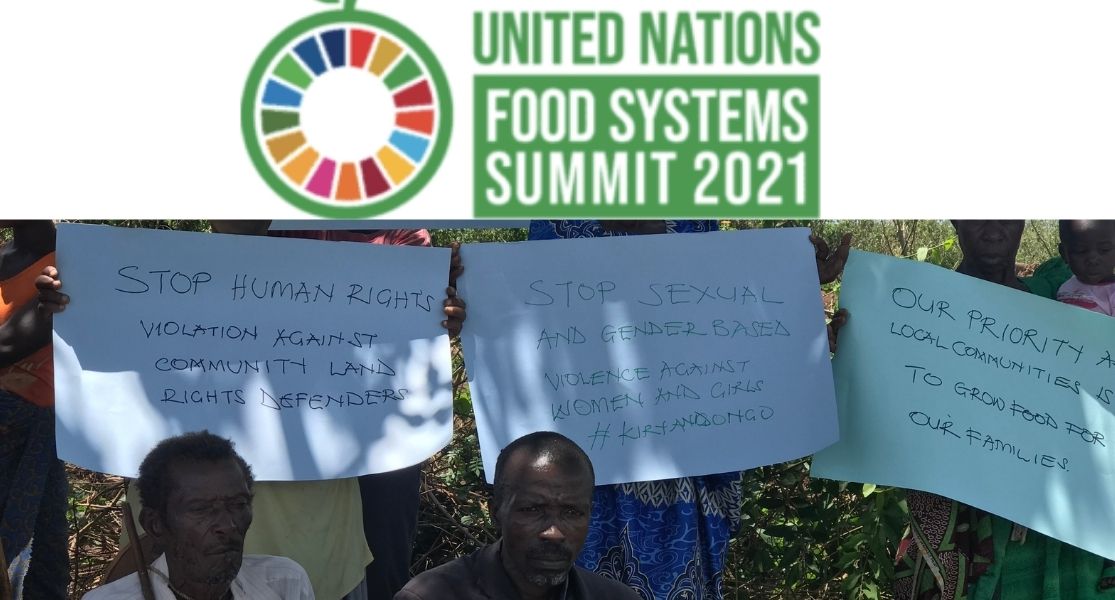
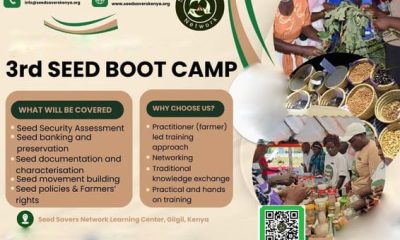
 MEDIA FOR CHANGE NETWORK2 weeks ago
MEDIA FOR CHANGE NETWORK2 weeks ago
 MEDIA FOR CHANGE NETWORK1 week ago
MEDIA FOR CHANGE NETWORK1 week ago
 SPECIAL REPORTS AND PROJECTS1 week ago
SPECIAL REPORTS AND PROJECTS1 week ago
 MEDIA FOR CHANGE NETWORK1 week ago
MEDIA FOR CHANGE NETWORK1 week ago
 SPECIAL REPORTS AND PROJECTS1 week ago
SPECIAL REPORTS AND PROJECTS1 week ago
 MEDIA FOR CHANGE NETWORK2 days ago
MEDIA FOR CHANGE NETWORK2 days ago
 NGO WORK1 day ago
NGO WORK1 day ago

